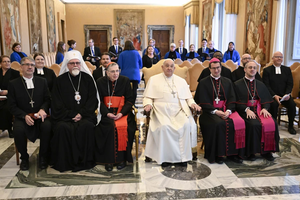A Little Bit of Christianity Is a Dangerous Thing
COMMENTARY: Christian virtues, like Christian doctrines, turn menacing when taken in isolation from each other

A high school in Canada recently canceled Mother’s Day (as well as Father’s Day) because it is not “inclusive.” The celebration of Mother’s Day in Canada goes back to 1915, only seven years after it was founded in the United States by schoolteacher Anna Jarvis as a special tribute to her late mother. When President Woodrow Wilson made it an official holiday in 1914, he introduced the apostrophe so that on Mother’s Day, each family would honor its one and only mother. In so doing, no doubt without thinking about it, he ensured that Mother’s Day would not be “inclusive.”
The notion of mother is both personal and specific. It is not an enigma. It does not include anything that is not a mother. And yet, the powers to be have decided to cancel something because it is not what it is not! Using this method of canceling something because it is not what it is not, by logical extension, would justify canceling anything that is not what it is not. And since nothing is not what it is not, then, by employing this violation of the principle of contradiction, everything should be canceled.
Dostoevsky claimed that human stupidity is “stupendous.” Yet, canceling Mother’s Day because it is not inclusive (which it never claimed to be) goes beyond stupidity. There must be another explanation why people, especially those in education, would rule in such a hare-brained manner. For well over 100 years in North America, people celebrated Mother’s Day for exactly what it represents — a way of honoring and celebrating one’s mother.
The inclusive strategy is essentially unrealistic — if used, it will inevitably backfire. A marketing official for Bud Light decided to be more “inclusive” and authorized a controversial transgender activist to appear on one of its beer cans. The result was catastrophic. The company lost more than $5 billion in sales within a few days and suffered an overall consumption drop of 26%. In being more “inclusive,” Anheuser-Busch lost, and therefore, “excluded,” a good percentage of its loyal beer drinkers. Meanwhile, two other brands of beer, Coors and Miller, have enjoyed sales boosts of 20.5 and 21%, respectively. Bud Light’s “inclusive” strategy worked very nicely — for its competitors.
How can we begin to understand this misguided love affair with the word “inclusive,” which is now pandemic? One place to begin is with Christianity — not Christianity as a whole, but as one of its fragments. As Christianity declines both as a religion and as a philosophy, shards of its former wholeness retain their appeal in the public sphere. The final words that Christ directed to his apostles offer the ultimate image of inclusivity: “Go, therefore, and make disciples of all nations, baptizing them in the name of the Father, and of the Son, and of the Holy Spirit, teaching them to observe all that I have commanded you” (Matthew 28:20). What could be more inclusive?
Selecting a fragment of Christianity, while rejecting the rest, will not be effective. It may be compared to a calculator that is missing the numbers 6 and 8. No matter how low the selling price of the calculator might be, no one would buy it, since it is defective and unreliable. Today, people seek justice as an end, but do not accept justice as a means to that end.
With regard to mercy and justice, as St. Thomas Aquinas explained, “Mercy without justice is the mother of dissolution” and “justice without mercy is cruelty.” Mercy crowns justice; it does not replace it. The virtues need each other in the same way that the various parts of Christianity need each other. Christianity is effective when it is whole. The absence of forgiveness leads to despair; the absence of humility leads to pride. As St. Paul informs us, “If I should speak with the tongues of men and of angels, but do not have charity, I have become as sounding brass or a tinkling cymbal” (1 Corinthians 13:1).
In his book Orthodoxy, G. K. Chesterton wisely pointed out, “When a religious scheme is shattered (as Christianity was shattered at the Reformation), it is not merely the vices that are, indeed, let loose … but the virtues are let loose, and they wander more wildly, and the virtues do more terrible things.” Thus, the present world is full of old virtues, truncated to appeal to popular sentiment. Isolated from the whole network of virtues, they wander alone and cause mayhem.
Inclusivity cannot stand alone, nor can “diversity.” They must be associated with factors such as unity, distinctiveness and common sense. A person may think that he is being progressive by being inclusive and trying to include everything, but he is like the person who has purchased the defective calculator and disregards the missing numbers.
















